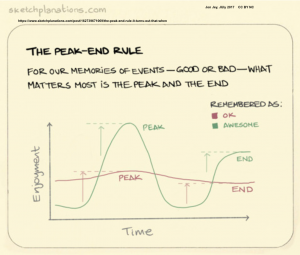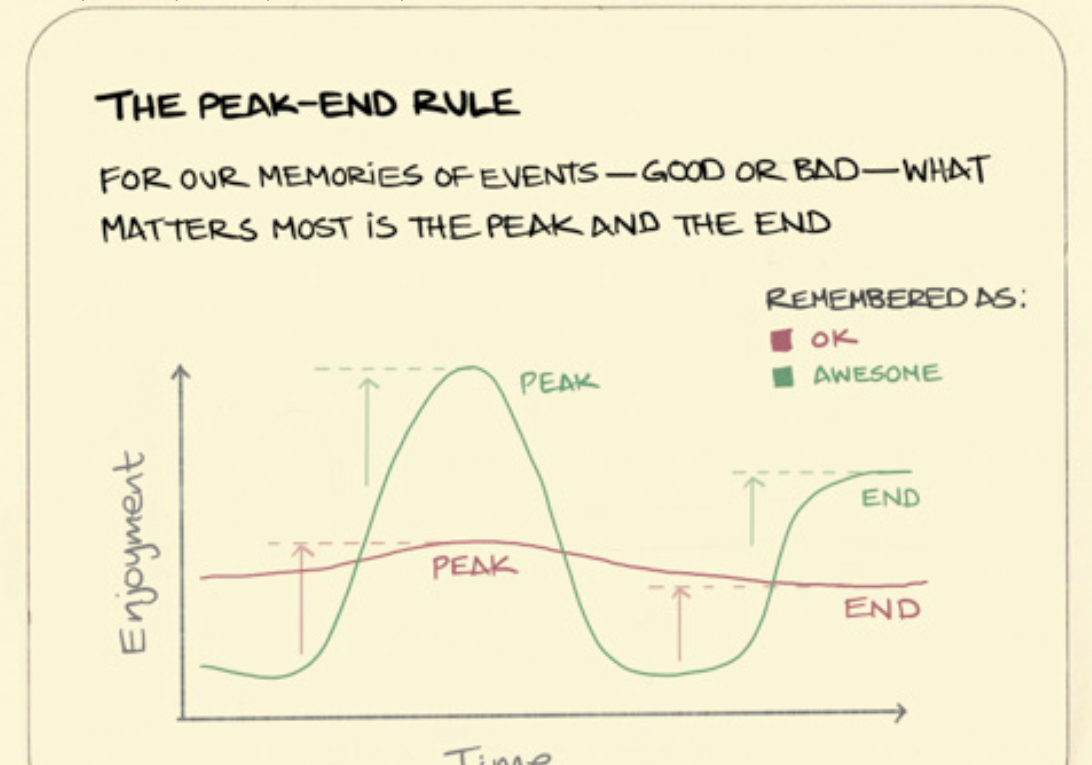Peak to end: Cognition and learning reflection
Week 12 – A reflection
What will you take from this course into your life (professional or personal or both, you choose)?
From this course I will remember the story, the ebb and flow, and the intensity of emotions tied to the tasks to be accomplished. Willingham (2009) posits that memory is tied to emotional reactions. I suggest it’s tied to our personal narratives, the story of that we’ll remember. As Herzberger (2016) writes, storytelling has value as a cognitive and epistemological tool. The story of this course is tied to the life narrative of my personal and family story, with several significant events woven through this course timeline. It’s tied to the story of those who took the course with me since we’ve shared so much time, and shared life events, together – Dan, Tim, Min, Sophie, Pinar, Anita, and Eduardo.
“Long-term happiness often depends on your forming a favorable narrative of your life” (Whitbourne, 2012). This course is favorably connected to my daughter’s wedding, the purchase of property in Windsor, and other major family events, which are now inextricably woven into my memory of the timeline of this course. Luckily, the course ebb and flow is captured on this blog I’ve created for my PhD journey [just search the category 6411 Cognition and Learning], as a space for personal reflection. Since limitations in my human cognition (Willingham, 2009) may prevent me from remembering all the details, or everything that I wrote about in the previous three months, I appreciate having an external long-term memory storage unit. It’s a place I can return, to review and to remember.
 As I was reading to wrap up this course, I came across ‘sketchplanations’ (Jono Hey) and discovered the peak-end rule. This is described by Whitbourne (2012) as “one of many errors of judgment that affects the accuracy of our cognitive apparatus”. Further to this, the “peak-end rule states that the way an experience ends determines the happiness we ascribe to it” (Whitbourne, 2012). So there is a cognitive reason for an end of course reflection, since “people rate their happiness while having a previous experience higher than they did while going through the experience itself” (Whitbourne, 2012). This peak-end rule, as reflective of the narrative of this course, is tied to two article critiques as they were ‘book-ended’ around my daughter’s wedding, and the work-flow to complete the essay, which has been upended by several trips to Windsor (6 hours each way) in order to find a place to live, to be closer to my 90-year-old mother-in-law, who’s health is declining.
As I was reading to wrap up this course, I came across ‘sketchplanations’ (Jono Hey) and discovered the peak-end rule. This is described by Whitbourne (2012) as “one of many errors of judgment that affects the accuracy of our cognitive apparatus”. Further to this, the “peak-end rule states that the way an experience ends determines the happiness we ascribe to it” (Whitbourne, 2012). So there is a cognitive reason for an end of course reflection, since “people rate their happiness while having a previous experience higher than they did while going through the experience itself” (Whitbourne, 2012). This peak-end rule, as reflective of the narrative of this course, is tied to two article critiques as they were ‘book-ended’ around my daughter’s wedding, and the work-flow to complete the essay, which has been upended by several trips to Windsor (6 hours each way) in order to find a place to live, to be closer to my 90-year-old mother-in-law, who’s health is declining.
I may not remember the details of the course assignments, or even the cognition and learning topics on which they focused. However, due to the emotional connections to these family life events, I will remember the feelings relating to the times I worked diligently to ensure the assignment tasks were completed on time. I may not remember the specific content of these assignments, but I’m sure the neuroplasticity of my brain (Boyd, 2015) has been impacted by the cognitive conceptualizations completed during those weeks. The peaks in this narrative are not course specific, but I can’t think of my daughter’s wedding without remembering the flurry of work to accomplish for this course in order to take time to celebrate this event. The end will be remembered, if the essay every gets pulled together to my satisfaction, not for the essay content or topic, but for the writing and reading I did while my husband drove the long road trips to-and-from Windsor, resulting in the purchase of property to be closer to his mom. The peak-end rule (Whitbourne, 2012), emotional reactions (Willingham, 2009) and my external long-term memory bank, will ensure that my cognition and learning course experience will be remembered.
References
Boyd, L. (2015). After watching this, your brain will not be the same. TEDxTalk Vancouver. Retrieved from https://www.youtube.com/watch?v=LNHBMFCzznE
Herzberger, D. (2016). Knowledge and transcendence: Javier Marias on writing and storytelling. Anales de la Literature Española Contemporanea, 41(4), 203-218.
Hey, J. (2017, July). The peak-end rule. [graphic image]. Retrieved from https://www.sketchplanations.com/post/162739671069/the-peak-end-rule-it-turns-out-that-when
Whitbourne, S. (2012, September). Happiness: It’s all about the ending. Psychology Today. Retrieved from https://www.psychologytoday.com/ca/blog/fulfillment-any-age/201209/happiness-it-s-all-about-the-ending
Willingham, D. T. (2009). Why don’t Students Like School? A Cognitive Scientist answers questions about how the mind works and what it means for the classroom. San Francisco, CA: Jossey-Bass.
